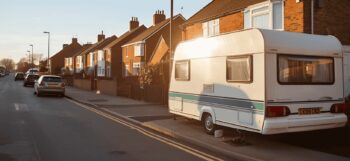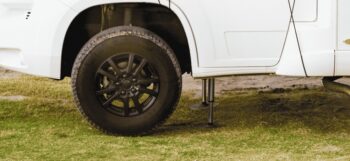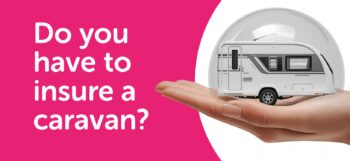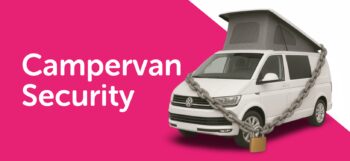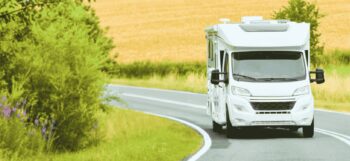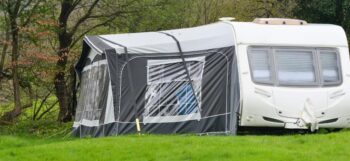Stealing caravans and motorhomes is as lucrative as stealing supercars, and as the popularity of ‘van life’ continues to grow, so too does the risk of campervan and motorhome theft. Criminals covet top of the range caravans, motorhomes, and campervans, due to the overwhelming demand in the UK and the relative ease of which they can be stolen.
In February 2021, This is Money reported that just 13% of motorhomes and 6% of campervans have trackers installed. 54% and 45% don’t have alarms respectively, and the majority are kept on driveways or on the road.
By adopting these simple security measures, you could deter thieves from targeting your vehicle.
Lock Up
Firstly, it pays to take simple precautions like closing windows and locking all doors when you are away from the vehicle, and never leaving valuables on display. The habitation door on a motorhome is a weak area and generally the entry point for thieves and opportunists. Installing a habitation lock, which can be locked from both inside and outside of the vehicle, can give you that extra bit of security while you’re sited or out on your travels.
Storage and Parking
Where you store your motor home can have a significant bearing on how your insurance premium is calculated. Storing your motorhome or campervan on a secure site, especially when not in regular use, can give you peace of mind that your vehicle is less likely to be targeted for theft or break-in. However, you need to bear in mind that just because sites are advertised as being safe and secure, it doesn’t mean they are. When choosing a site to store your vehicle on, it’s important to check the level of crime in the area – it’s worth finding out how many break-ins the site has had, and over what period. You should also be sure the site has the correct measures in place to keep your vehicle secure. Ideally, the perimeter fencing should be 6ft high and constructed from metal, and there should be an alarm system in place. The site should be gated, and access should only be obtained with a pass or combination code. Look for sites that have 24-hour CCTV surveillance.
Caravan Storage Site Owners’ Association (CaSSOA) sites are good sites to use. They are given platinum, gold, silver, or bronze ratings, based on the level of security and services offered. A list of trusted sites can be found on the CaSSOA website.
If you have no choice but to park your motorhome on your driveway, turning the swivel driver’s seat in to face the living area while not in use will make it much more difficult for the vehicle to be driven away in a hurry.
Alarms
Alarms are still one of the best security measures you can take to keep your vehicle safe. Motorhome alarms are a necessity, but not all motorhomes come with an alarm system already installed. In most cases the sound is sufficient to scare a would-be thief away. Displaying a window sticker to warn potential thieves that your vehicle is protected by an alarm could drastically reduce the risk of a stolen motorhome.
Immobilisers
Immobilisers have been a compulsory feature for new vehicles in the UK since 1998, but if you own an older model, it’s worth looking into whether you can have one fitted. An immobiliser will activate each time your vehicle is switched off, making it difficult for anyone without a key to start the engine. As electronic key fobs are used to access most modern vehicles, thieves have become smarter and are now able to use computer gadgetry to bypass immobilisers, meaning they shouldn’t be the only form of protection you have in place.
Trackers
If your motorhome is worth £50,000 or more, you will need to have a tracker fitted. Trackers should always be fitted by an expert and a copy of the installation certificate is needed, for insurance purposes. If you are unfortunate enough to have your motorhome stolen, the tracker will send a signal to a control centre, pin-pointing the vehicles location, making is easier to recover.
Use a Visual Deterrent
Wheel clamps wrap around the outside of the tyre and usually cover the wheel bolts, preventing the wheel from rotating. Steering wheel locks can be a bar-lock, circular lock or even a chain and padlock. Whether you use one or the two in conjunction, both are time consuming to remove and may make a potential thief think twice about targeting your vehicle.
Install a VIN Chip
The VIN number is the first thing the police look for, when trying to identify stolen vehicles. Getting a VIN chip installed supports a fast and reliable process of vehicle identity confirmation, as well as being a great deterrent, with its ‘unique’ connection to the Central Registration & Identification System database (CRIS). It can aid quick recovery in the event of a theft and visible security labels displaying the VIN code warns thieves that your vehicle is protected.
Get a Safe box
As previously mentioned, leaving personal belongings in plain sight is playing into the hands of an opportunist. Store items where they cannot be seen while you are away from your vehicle to remove the temptation for light fingers. If you have room, a lockable safe box can give you that extra bit of security by keeping your personal belongings well concealed, requiring a key or digit code to open it.
Get Good Insurance Cover
Finally, make sure you have good motorhome insurance so that should the worst happen, you are covered. We work with a panel of leading UK insurers to bring you feature rich motorhome cover. We also have a dedicated Customer Care Champion who can act on your behalf and offer guidance through the claims process, should you need it.
Contact us today for a no obligation quote here or speak to one of our customer advisers on 01480 402 460. We’d be more than happy to help!
Other useful articles: Outsmart the Thief and Protect Your Motorhome or Caravan


